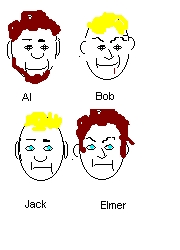Top
Back
Forth
Mind and Human Knowledge
a very broad topic..
More narrowly:
in cognitive science:
1 mental content/belief
in philosophy of science:
2 scientific theory/explanation
example:
knowledge of relativity theory
a mental structure
knowledge of a medical expert
both
a description of the world
There are other forms of knowledge, e.g
3 everyday knowledge ("cat on the mat")
4 skill (knowing how vs. knowing that)
procedural vs. declarative knowledge
so it is perhaps a question, whether it is meaningful to
seek one concept for knowledge/mind/mental representation etc.
Notice the following:
(a) prevailing view
of knowledge presupposes connection bw. 1 & 2
(as revealed in the propositional theory
)
(b) alternative picture(s) also connects 3 & 4
which is not to say we look for a definition of knowledge...
as we will see, the game is different
The Propositional Theory
or propositional conception, of knowledge
(in a simplified form, by examples
)
scientfic theory is essentially text
true/false
properties of sentences
cf. Vienna Cirlce, IUHPS/DLMPS - confirmation, justification, paradoxes,
circularity, etc etc
mental content is linguistic, nouns
meaning is reference
properties of sentences
cf. Chomsky, LoT, connectionism debates (productivity, systematicity
etc)
Consequences
in AI and classical cognitive theory (theoretical linguistics, logic, semantics
etc):
e.g. the relevant unit of analysis is
-
token-like
(e.g. store, transfer, share! cf. identity!)
-
passive
(representation, data, etc.)
-
typed
(categorical)
Now there are several ways of deconstructing
this cheerful view...
the simplest goes by showing that
-
there is no literal meaning (Lakoff),
-
or no meaning at all (Wittgenstein),
in language so conceived
A most recent challenge comes from the study of writing
- the notion
of propositional mind is based on a temptation from writing
- writing is
spatially extended and persistent end product of a process incolving mental
content
-
which does/may not have these properties
- names Ong,
Nyiri, etc
- type - and
categoricity properties of written/printed language
- truth and falsity
(as used in logic & phil.) are properties of written language
- nominalization a property
(since Greek) of written language
- cultural history
of writing (from less typed handcopy to Gutenberg print)
Wittgenstein
meaning is not private (that is, not inherent) - methodological anti-individualism
(social externalism)

language is not categorical
- family resemblance (disj. class def.)
words etc.: no meaning but
use - subordinate to situations
no exchange of meaning,
but sharing of situations
(of which words etc are just
associated parts)
voice of community,
or tradition (cf. we can't be wrong, Davidson)
Ong - Nyiri
meaning becomes categorical
by writing (which first appeared in Plato)
especially by the
introduction of printing and reproducibility (identical words, identical
meaning)
identity does not exist
-
acoustically
mentally
in situation
in action
truth and falsity
(i.e. relationship bw. meaning and ~) not property of thought but of text
Support from evolutionary linguistics/sociolinguistics
W. Croft, Sándor
and Kampis
:
-
continuity from dialect to idiolect (no two
speakers are identical)
-
analogy between species (Darwin) and language,
illustration
Support from anti-essentialism in general
(e.g. dissatisfaction with language is as old as philosophy, both
East and West)
advantage of writing ? maybe, but that's a
different question.
Brief Summary
Mind is not (propositional) language, language
is not text, meaning is not categorical,
knowlegde is not categorization! (further link)

